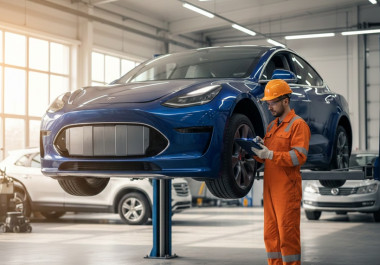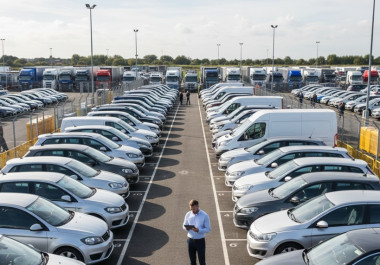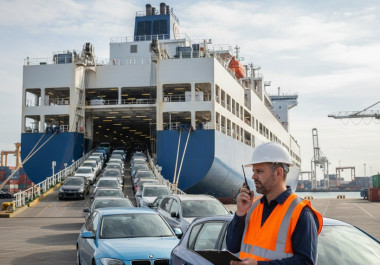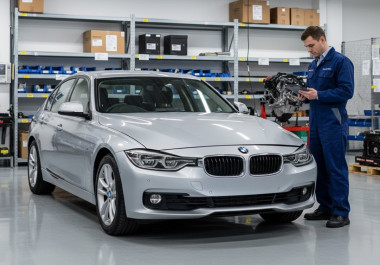In the motor trade, the sharpest buyers understand one truth: the final price isn't just the winning bid. The real cost includes tax.
Buying a car at auction, especially here at RAW2K, is a brilliant way to find a deal. But an unexpected tax bill can ruin that win instantly. Understanding the auction tax implications when buying a car is essential to protect your wallet. This covers VAT, road tax, import duties, and even how HMRC views frequent trading.
First, Why Do Auctions Have Different Tax Rules?
A private car sale is simple. Auctions are different because you’re often buying from a business.
Many vehicles at auction are ex-fleet, ex-company, or repossessed. This means a business is the seller, and when a business sells an asset, Value Added Tax (VAT) often applies. This is the single biggest and most important surprise for newcomers.
Getting to Grips with VAT: The Main Hurdle
An unexpected 20% charge on the final invoice will sour any deal. That's why understanding the rules for VAT on auction cars is critical.
When Does VAT Apply?
VAT at the standard 20% rate typically applies to vehicles sold by a VAT-registered business. This includes:
-
Ex-Company and Fleet Vehicles: Cars and vans previously used for business.
-
Commercial Vehicles: Most vehicles in our van auctions or truck auctions are subject to VAT.
-
VAT Qualifying Cars: This key phrase means VAT will be added to the final hammer price.
How to Spot VAT in an Auction Listing
Here at RAW2K, all listings are clearly marked. Here’s what to look for:
-
"VAT Qualifying" or "Plus VAT": This is your signal that the bid is not the final price. A £10,000 winning bid becomes £12,000 (£10,000 + 20% VAT).
-
"Margin" Vehicle: You won’t pay separate VAT. The seller (usually a dealer) uses a special scheme, so the price you bid is the price you pay for the car.
-
No VAT Mentioned: This usually applies to privately owned cars. What you bid is what you pay.
If you are ever unsure, it's always smart to get in touch with our team before you bid.
Remember: The Hammer Price Isn't the Whole Story
It’s a classic auction tale. A buyer wins a car for £8,000, absolutely chuffed. That smile disappears at the payment desk when the invoice shows an extra £1,600 in VAT. They missed the "VAT Qualifying" note in the description. It’s a painful lesson that’s easy to avoid by reading the details carefully.
The Upside for Business Buyers: Reclaiming VAT
For business buyers, that "VAT Qualifying" sticker is good news. A VAT-registered business buying a vehicle for company use can typically reclaim the 20% VAT paid. This makes ex-fleet and commercial vehicles fantastic value. Just ensure the paperwork is in order and the vehicle's use qualifies.
Next Up, Road Tax: It's Your Responsibility
After VAT, the next immediate step is road tax. It used to be that any remaining tax came with the car. Not anymore.
The moment you buy a car at auction, any existing road tax is cancelled.
The new owner must tax the vehicle in their name before driving it on a public road. Driving an untaxed vehicle is illegal and risks a DVLA fine of up to £1,000.
To get road-legal, you need three things:
-
To be the new registered keeper.
-
A valid insurance policy.
-
A valid MOT certificate (if the car is over three years old).
You can tax it online in minutes via the DVLA website with the new keeper slip (V5C/2).
Tackling Imports and Customs Duties
Imported vehicles offer more choice, especially in motorcycle auctions, but they come with another layer: potential import duties.
While most auction houses ensure duties are paid before listing, it's a vital point to confirm. An unclear import could land you with a surprise tax bill. Always check the vehicle's history for proof that it’s fully UK-registered.
For classic fans, vehicles made over 40 years ago generally qualify as "historic," making them exempt from road tax.
Finally, When Does a Hobby Become a Business?
Buying one car for yourself is straightforward. But what if you start buying and selling regularly?
Be careful. HMRC may decide your "hobby" is a "trade." If you’re deemed a motor trader, you must declare your profits and pay income tax on them. If you buy with the main intention of selling for a profit, you are likely trading. If this is your goal, set up properly and speak to a tax professional for guidance.
Your Pre-Auction Tax Checklist
To simplify the main auction tax implications, here’s a final rundown of what to check before you bid:
-
VAT Status: Understand the rules for VAT on auction cars. Is it "Plus VAT," "Margin," or "No VAT"? Do the maths first.
-
Road Tax Plan: Have insurance ready to tax the vehicle online instantly.
-
Buyer's Fees: Budget for the buyer's premium (a percentage of the hammer price), which is also usually subject to VAT.
-
Documents: Review the V5C, MOT history, and all paperwork.
-
Transport: If you can't get it road-legal right away, budget for a recovery service.
Final Thoughts: Bidding with Confidence
Navigating auction tax implications isn't daunting if you do your homework. Understand these points, and you can bid with total confidence, knowing the final bill.
Online auctions are packed with amazing deals. You can view all cars available for auction right now and put this knowledge to the test. Happy bidding.




